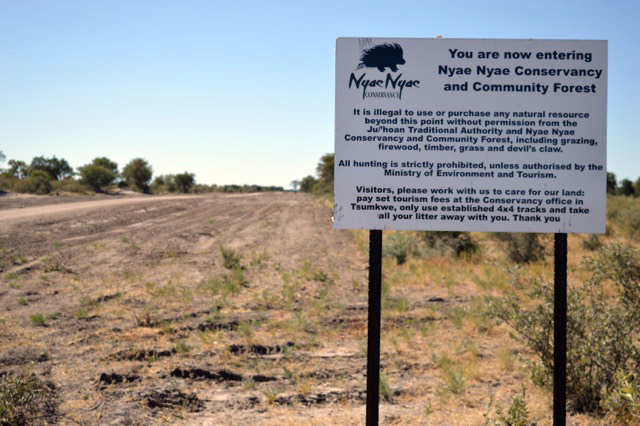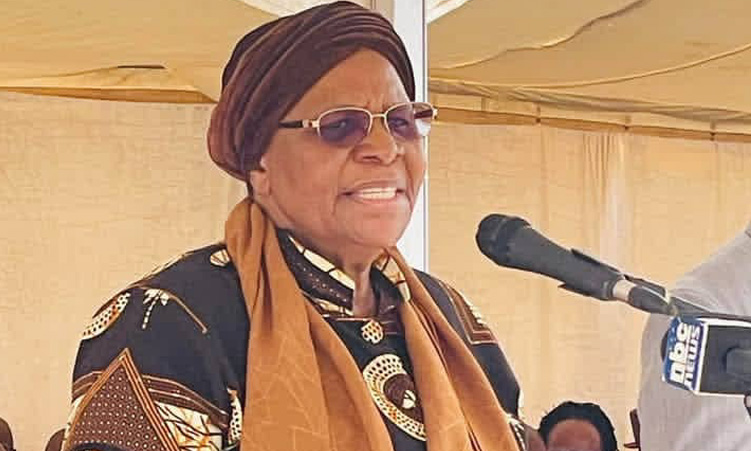SEVEN farmers accused of unlawfully grazing their livestock on communal land in the Tsumkwe area should be evicted and barred from the Nyae Nyae conservancy and communal forest, a judge of the High Court has ordered.
The seven farmers, who are alleged to have ignored repeated efforts by the Ju/’hoansi Traditional Authority and the Nyae Nyae Conservancy to get them to remove their livestock from San communal land in the Tsumkwe area, and their livestock and agents are restrained from unlawfully occupying the Nyae Nyae conservancy and communal forest, judge Thomas Masuku has directed in an order granted in the Windhoek High Court on Friday.
He also ordered that the farmers and their agents may not let their livestock graze in the conservancy and communal forest, and may not enter the conservancy without authorisation. The order was released yesterday.
Judge Masuku issued the order after the seven farmers failed to follow up on their initial indications that they would be opposing an application against them by the Ju/’hoansi Traditional Authority, Ju/’hoansi chief Tsamkxao ‡Oma, and the boards and management committees of the Nyae Nyae communal conservancy and forest.
Judge Masuku also ordered the Inspector General of the Namibian Police to start, expedite and finalise a police investigation into criminal charges laid against the farmers under the Forestry Act and the Communal Land Reform Act. In addition to that, the Ministry of Agriculture, Water and Forestry’s director of forestry and the forestry officer responsible for the Nyae Nyae communal forest were ordered to take steps in terms of the Forestry Act to seize and detain animals unlawfully grazing in the communal forest, with a direction that such animals may only be released outside the forest area.
The Nyae Nyae conservancy, declared in February 1998 and encompassing an area of nearly 9 000 square kilometres, is the oldest and second largest conservancy in Namibia, and most of its 2 300 residents are from the Ju/’hoansi San community, ‡Oma informed the court in an affidavit.
Grazing areas in the conservancy are maintained with great effort and cooperation of local community members, with the aim of ensuring the sustainable use of the land and mitigating the effects of overgrazing, ‡Oma said.
He explained: “Controlled grazing areas are rotated and properly managed to ensure sustainable viable grazing for the benefit of the local community’s livestock and to avoid the deterioration and loss of topsoil through erosion and encroachment by opportunistic plant species.”
In April 2009, however, four of the seven farmers cited as respondents in the case – Kauheva Vetiaje, Murambi Ndjandereeko, Matiro Dikuwa, and Ngome Ngombe – together with 30 other farmers from the Gam area and their livestock unlawfully occupied parts of the communal area and conservancy under his jurisdiction, ‡Oma said.
Other farmers followed the first farmers that occupied Ju/’hoansi communal land, ‡Oma said.
The seven farmers involved in the case are not members of the Ju/’hoansi traditional community or the Nyae Nyae conservancy, and are not entitled to benefit from the local community’s forest, ‡Oma stated.
By December 2013, the chairperson of the Nyae Nyae conservancy and community forest sent a letter to Namibian Police Inspector General Sebastian Ndeitunga, asking for his assistance to enforce the law against illegal occupants of the conservancy and forest, but the situation remained unchanged after that, ‡Oma recounted.
A letter was also addressed to the Office of the Prosecutor General in February 2017 to ask for assistance from that quarter, but that also did not resolve the situation, ‡Oma indicated.
He informed the court that according to a veterinary livestock register, the seven farmers involved in the case – Vetiaje, Ndjandereeko, Dikuwa, Ngombe, Tjizera Kavezenji, Tjitindi Vazapo, and Kaapuhu Majuva – had a total of about 270 head of cattle and also smaller numbers of other livestock in the area.
The application against the farmers was filed by Legal Assistance Centre lawyer Willem Odendaal on 22 March this year.
On 26 April, the farmers’ lawyer, Patrick Kauta, gave notice that they would oppose the application, but with no further steps taken by them to defend the matter the order was granted on Friday.
Stay informed with The Namibian – your source for credible journalism. Get in-depth reporting and opinions for
only N$85 a month. Invest in journalism, invest in democracy –
Subscribe Now!







